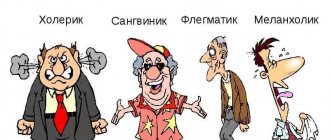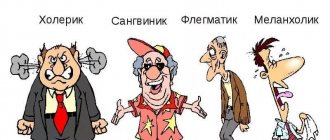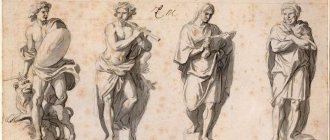What is temperament
Temperament is the foundation of personality: the very solid foundation on which actions, the direction of thought, views on various aspects of life and the structure of the individual as a whole are based.
Temperament determines how resilient a person’s psyche is, that is, what strength the processes of excitation and inhibition have, how balanced and fluid these processes are.
Discovery of temperament
The Soviet scientist-physiologist Ivan Petrovich Pavlov made a huge breakthrough in the development of psychology, developing a detailed description of possible options for the formation of conditioned reflexes. For example, if excitation dominates, reflexes form faster than they fade. If inhibition predominates, the opposite is true. Thus, it becomes clear that each person, depending on their innate characteristics, needs an individual approach, be it the process of education, training or correction.
Temperament and personality traits
Temperament is an innate concept that denotes the entire spectrum of mental properties and directly influences the formation of one’s personality. Criteria such as the speed of mental activity, its rhythm and tempo, intensity, stability and direction depend on the temperament inherent in the child by nature. In addition, it is he who determines how emotional and impulsive a growing person will be, as well as whether he will be characterized by anxiety, impressionability and dozens of other properties.
Temperament and character
Don't confuse character with temperament. If the first can change more than once under the influence of society, then the second is given once and for all, but if you wish, you can learn to manage it competently.
Temperament and activity
The individuality of the style of a particular activity is another merit of temperament. Two people can arrive at the same result in completely opposite ways: for example, one of them will get an A on an exam by copying from a neighbor, and the other will get an A on their own.
Mask of laughter
Temperament is also associated with the physical qualities of a person.
Temperament is also associated with the physical qualities of a person. Sanguine people, as a rule, have a picnic build, they tend to be overweight, and in their facial muscles the muscles that raise the corners of the mouth are genetically better developed. When the situation is clearly cheerful, the sanguine person laughs. The more often he laughs, the more these muscles develop. A sanguine person is already an optimist, but in the process of life he becomes even more optimistic: when the situation is emotionally uncertain, most likely, the corners of his lips will be raised upward. At the same time, as studies have shown, mood actually improves. Based on the theory of James Lange, indicating the connection between emotions and muscles, the Americans put forward the thesis: “Keep a smile.”
Melancholic people who are prone to depressive reactions have genetically more developed facial muscles that pull the corners of the mouth down. This is why melancholic people become even more melancholic throughout their lives. Phlegmatic and choleric people have a horizontal mouth line.
Start your education with the “mask of laughter” exercise. It is performed in front of a mirror. Inhale slowly. The corners of the mouth rise upward as much as possible, the eyes squint, the mouth opens slightly, exposing the teeth. Hold your breath. Now exhale quickly and relax your facial muscles. This exercise should be done as often as possible, preferably in combination with other exercises to strengthen the facial muscles.
How does temperament differ from character?
Let us remember that these are two completely different concepts. Character is formed, consolidated or changed under the influence of the following factors:
- education depending on the family situation;
- systematic independent work on oneself (self-education, self-development);
- the degree of acceptance of certain norms provided by the environment;
- analysis of acquired life experience.
In order to change even slightly in character, it is not enough to meet one of the listed conditions: their combination is required.
It is impossible to radically influence temperament as a property of human nature given from birth. However, using the same conditions given above, you can take control of it. The main criterion will be the desire of the person himself, patience and perseverance: the necessary changes will not happen in one hour, a systematic approach is important here.
Properties of temperament
In fact, these are the data inherent in a person by nature, which affect the speed, stability and intensity of mental processes.
Sensitivity
This is the force of influence from the outside, necessary to launch processes in the psyche. Sensitivity also determines their speed.
Reactivity
Affects the intensity and speed of reaction to a sudden stimulus: a loud sound, a light suddenly turned on, an unexpected action on the part of another person, and so on. Reactivity determines how much an individual is able to concentrate or, conversely, be distracted from business.
Activity/passivity
How quickly a person can influence the circumstances that interfere with achieving a goal. Directly depends on reactivity: the ability at one time or another to concentrate on one’s desires, goals, motivation, beliefs, needs.
Plasticity/rigidity
This concept determines how quickly an individual is able to get used to new conditions. Plastic means perfectly adapted to change. Rigid - on the contrary, experiencing difficulties in changing point of view, any interests and opinions.
Extroversion/introversion
A popular term meaning focus on the external world around us (Latin extra - “outside”), or into one’s subjective inner world (Latin intro - “inner”). Extroverts are more focused on events occurring in the present, here and now. Introverts are more focused on images of the past or future.
Emotional excitement
The rate of activation of the nervous system in response to external stimuli. Here we mean the most minimal reasons that prompt a person to react emotionally to what is happening.
Rate of reactions
Another integral property of temperament, which lies in the speed of mental processes and the duration of a particular reaction. An example would be the speed at which a person talks, or how quickly he reacts to a ball flying towards him.
What is the difference?
Temperament is the foundation on which personality is formed as a social being. Traditionally, there are four types of temperament:
- sanguine,
- choleric,
- phlegmatic person,
- melancholic.
“Temperament can be determined from childhood: it is enough to observe the child and note a number of characteristic features inherent in one type or another.
There are also many psychological tests, by answering the questions of which you can easily classify yourself as one type or another,” says Nina Novichkova, sales director of the recruiting company Adecco Group Russia. Temperament can be determined from childhood.
Corresponding member of the Russian Academy of Natural Sciences, Candidate of Medical Sciences, psychotherapist of the European registry Mikhail Litvak in his book “The Sperm Principle” discusses how important it is to take into account your temperament when choosing a profession. “Activity characterizes the expression of a person’s energy potential, with which a person achieves a goal and overcomes obstacles,” notes Mikhail. — Activity is, of course, the main quality of temperament that contributes to achieving the goal. The phlegmatic person is most active. True, due to low reactivity, the phlegmatic person turns on somewhat more slowly. To my surprise, there were quite a few phlegmatic people among the goalkeepers. Their reaction is fast, but they achieve this speed slowly. Interruptions are detrimental for them.” When Mikhail was a consultant in the handball team, he advised the coach not to replace the main goalkeeper (she turned out to be phlegmatic) for one or two minutes, since it is difficult for her to get involved every time, but to replace her completely when the game is already over. He advised the tennis player, who almost always lost the first game, to take this fact calmly and just warm up longer.
The fact is that it is difficult to go against nature. If you are a phlegmatic person, do not take breaks from your studies. Don't be afraid to get overtired. You have enough energy for three. A choleric person with high activity and reactivity can do a lot and still swear, even when his partner does not hear him (for example, sometimes a driver curses another driver whose car is already far away). Well, swear if it makes you feel better, but remember that it is a waste of energy. Sanguine people are quite active, but if the activity is monotonous, they can quickly lose interest in it. It is better for them to choose an occupation where they need to switch frequently. Organizing corporate evenings, mass celebrations, dispatch work - this is the field of activity for a sanguine person. For a phlegmatic or melancholic person this is disastrous. The melancholic person has the lowest activity: he requires special conditions for work, preferably an office environment.
The pace of reactions determines the speed of mental processes and is easily measured by the number of associations (thoughts) per unit of time. It is elevated in choleric people, sanguine people, as well as in well-rested melancholic people. Phlegmatic people have slower reactions. Ignorance of these features often leads to misunderstandings. Among managers of various ranks, one can quite often find choleric and sanguine people with an accelerated rate of mental reactions. If they do not know the psychological laws of communication and, moreover, they have reduced sensitivity (the ability to feel, understand another person), they do not notice that their subordinates - phlegmatic and melancholic - do not have time to follow the course of their thoughts. Managers get the impression that their subordinates are stupid. In accordance with this conclusion, personnel placement, work distribution, etc. occur. Often, bosses are happy to get rid of melancholic people, and then with surprise and bitterness they learn what profit this slow worker brought to another enterprise. Phlegmatic and melancholic people should try to increase their rate of mental reactions. The best help here is not psychological exercises, but game sports.
Four types of temperament
The ancient Greek physician Hippocrates believed that the temperament of a person is determined by one of the so-called “body juices”: black bile, yellow bile, blood or phlegm (lymph).
Classification according to the processes of excitation and inhibition
Based on ancient teachings, several types of classifications of temperament appeared in psychology. All of them distinguish 4 types of temperament: choleric, sanguine, phlegmatic and melancholic.
Sanguine
Active, enterprising, fairly balanced. The sanguine type is characterized by rapid processes of excitation and inhibition.
- Cheerful, active, sociable, responsive, successful in many areas of life.
- Rarely worries about failures or gets upset over trifles, tends to be a leader, and easily gets used to new conditions.
- Multitasking: Easily switches from one task to another.
- He needs a constant influx of impressions, otherwise he gets bored.
- Emotions replace each other quite quickly and are therefore unstable. Nevertheless, the sanguine person knows how to competently manage them.
- Resourceful, inventive.
- He is characterized by a loud, sincere laugh, fast speech and agile facial expressions.
Phlegmatic person
He is characterized by little activity, mostly inactivity, and balance. Conditioned reflexes are very stable, but they form rather slowly.
- Overly cautious, judicious, rather passive. It can be tedious and boring.
- Friendly, peace-loving, reliable comrade.
- Inclined more towards conservatism than change.
- Restrained, cold-blooded, sometimes too much.
- Such a person is easy to manipulate.
Choleric
Impulsive, hot, active, not very balanced type. The braking speed is much weaker than the excitation process.
- Calmness is definitely not his thing: choleric people are prone to mood swings and even aggression.
- Extremely fickle, impulsive, optimistic.
- He has gorgeous facial expressions, active gestures and fast speech.
- He can be loud, impatient, and often completely unable to cope with his own emotions.
Melancholic
It can be both mobile and vice versa. At the same time, weak, unbalanced, apathetic.
- Prone to constant anxiety and bad mood, even if there is no reason for it.
- Emotional, sensitive, easily hurt.
- Provides extremely weak resistance to external stimuli.
- Self-doubt, timidity, and touchiness are constant companions of a melancholic person.
- He speaks quietly, without obvious facial expressions or gestures.
- Poorly adapts to new conditions.
Typology of Claudius Galen
Taking the teachings of Hippocrates as a basis, Claudius Galen, an equally significant figure in ancient medicine, invented the familiar typology of temperaments, according to which:
- the predominance of blood makes a person sanguine (mobility, cheerfulness);
- the predominance of lymph is characteristic of a phlegmatic person (slowness, calmness);
- yellow bile means that the individual is choleric (impulsiveness, the ability to do something rashly);
- black bile is melancholic (pessimistic, sad, wary).
Sanguine
In most cases, he lives by emotions. Can perform some action in the heat of the moment, but then quickly cool down. Very naive, inclined to trust others. Strives to enjoy life and everything he does.
Choleric
Hot, ardent, passionate type. Remembers both positive events and bad ones well. He is characterized by rancor, vindictiveness, inflated pride and narcissism.
Phlegmatic person
Outwardly quite neutral, not inclined to extremes. It is difficult to anger such a person: he rarely falls under the influence of his own emotions.
Melancholic
Sad, passive, pessimistic, he will find a reason to be sad under any circumstances. It is characterized by very one-sided extremes: if a negative event in life is a local end of the world, if there is a small reason for frustration, then suffering on a universal scale. Any achievement seems to him to be a path through pain. Often complains of loneliness. It is very easy to offend such a person with a word.
Signal system proportions
The signaling system is all existing mental processes that are responsible for the perception of information coming from the outside, its analysis, conclusions and appropriate reaction. There are two types:
- the first signaling system means the assimilation of received information (processes occurring in the cerebral cortex);
- the second signaling system is everything related to the ability to speak.
If we consider their relationship, we can recognize three types of people. This classification, however, is considered very relative and directly depends on the particular activity that a person encounters.
Artist
The first signaling system predominates in him.
Thinker
It is characterized by the predominance of the second signaling system.
Mixed type
Approximately equal ratio of both types of systems.
Types of temperaments and their characteristics
Ancient scientists thus identified the main types of temperaments, of which there are four:
- A sanguine person
is an energetic, cheerful and sociable, balanced individual. - A choleric person
is an energetic but unbalanced person, subject to fits of rage and anger, who has difficulty controlling his actions. - A phlegmatic person
is a balanced, calm and slow person who scrupulously carries out his duties and is not prone to fuss. - A melancholic person
is an unbalanced and weak person, subject to feelings of fear and sadness.
In principle, this classification of temperament types has not lost its meaning today, however, pure melancholics, cholerics, sanguines and phlegmatics are quite rare. Therefore, it usually makes sense to talk only about a mixed type of temperament.
The classical system is widely in demand in culture - literature, science, art. Of course, modern scientists understand that there is no “predominance of vital juices”, and the type of temperament is determined by an imbalance in the neurochemical system of the body. If the imbalance reaches an extreme degree, then the temperaments flow into the so-called psychiatric profiles, and each of them can develop into a specific mental disorder: choleric people suffer from impulsive personality disorder, sanguine people suffer from hypomania, phlegmatic people suffer from schizoid personality disorder, and melancholic people suffer from anxiety disorder.
The study of temperaments was carried out throughout the twentieth century and continues to this day. Many researchers note that the classical understanding of the type of temperament consists of two components: behavioral activity and emotionality. Based on this, improved classifications were built. And the fact that a person’s temperament depends on the type of higher nervous activity was first proven by the great Russian scientist I. P. Pavlov. He established that higher nervous activity has a similar structure in humans and higher animals. Thus, a certain type of temperament is characteristic not only of humans, but also of the most developed mammals.
There are other theories and classifications that divide personalities according to their properties. One of the most popular classifications is the division of people into extroverts and introverts proposed by Carl Jung. The first unite choleric and sanguine people, and the second - phlegmatic and melancholic. Extroverts are focused on interacting with external stimuli, while introverts are focused on their inner life.
Constitutional theory of Ernst Kretschmer
This typology was created by psychologist and psychiatrist Ernst Kretschmer based on the discovery of stable connections between a variety of temperament and an individual’s innate physique. In simple words, people with certain differences in the constitution of the body have corresponding features of the structure of the psyche.
A preliminary assessment of body structure often helps to establish contact from the first minutes of communication.
Asthenic type (schizothymic)
Absolutely weak-willed, withdrawn, focused on his inner world. Prone to sudden mood swings. On the one hand, he is an intelligent dreamer, on the other, he is a stubborn egoist and abstract dreamer.
Pyknic type (cyclothymic)
He is either at the very top of the emotional wave, or sharply goes to the bottom. Being cheerful, positive and very talkative, he easily gets used to any company, becoming an ideal interlocutor.
Athletic type (ixothymic)
It's hard to surprise him with anything. Calm, reserved, not generous with gestures and facial expressions. It costs him enormous effort to adapt to new conditions. Doesn't have flexible thinking.
Are you flexible or rigid?
Psychologically literate managers know that an extrovert can handle search work better, but if precise execution is needed, an introvert will be useful.
Emotional excitability reflects the threshold of the minimum impact required for the occurrence of an emotional reaction, as well as the speed of its development. For example, with sanguine, choleric and melancholic types of temperament, emotional excitability is increased, and with phlegmatic types it is decreased. It is important to understand that this is neither good nor bad, it is simply a feature of the body and psyche. Plasticity reflects the ease and flexibility of a person’s adaptation to external influences. Sanguine people have the highest plasticity.
Rigidity is the opposite quality, it is the inertia of adaptive behavior. Phlegmatic people, melancholic people and choleric people are rigid. If the company is expecting changes, sanguine people will endure them relatively easily, but people with other types of temperament will be anxious, afraid, worried. A person with a flexible temperament has an easier life: he is more happy and adapts to a new environment faster. In our rapidly changing world, this often becomes decisive in the matter of professional success. Is there anything that can be done here? Mikhail Litvak is sure that, of course, it is possible. You just need to act systematically.
Melancholic and phlegmatic people suffer mainly from the peculiarities of their temperament. “It is from the features, not from the shortcomings. All variants of temperament are the norm,” continues Mikhail. “You just need to know yourself, and then the features of your personality will bring both you and those around you joy, not grief.” The same rules apply here as when assessing your physical data. If you are 172 cm tall, then you need to understand that the chances of achieving great success in basketball are insignificant. But if you’re already on a team, then it’s better not to apply for the role of center.” You can also compensate for your low height for basketball with jumping ability, shooting accuracy, and understanding of game strategy. Of course, there are sports where your height will be an advantage, but there is not always a choice. Therefore, you should adapt.
Traits such as extroversion and introversion are also associated with temperament. An extrovert is more likely to focus on external impressions, while an introvert is more likely to focus on internal ideas. Psychologically literate managers know that an extrovert can handle search work better, but if precise execution is needed, an introvert, who is more inclined to desk work, will be useful here. Mikhail Litvak is sure that character is mixed with temperament, but a person’s fate depends on character. “If you sow an opportunity, you will reap a habit. If you sow a habit, you will reap a character. If you sow character, you will reap destiny,” says a famous proverb.
Definition of temperament and brief instructions for interaction
To determine a person’s temperament from the outside, as well as for self-diagnosis, many methods have been created that show the most accurate result.
- Hans Jurgen Eysenck's questionnaire contains one hundred questions and only two possible answers: yes or no. The test is also notable for the fact that it can be used to recognize a mixed type.
- The method of Nikolai Nikolaevich Obozov is a scale on which you need to select the degree of manifestation of a particular property.
- Diagnostics according to Vladimir Rusalov is in many ways similar to Eysenck’s psychological test, but there are a little more questions - 105. They need to be answered quickly, without going into long thoughts.
- Jan Strelyau's method for diagnosing temperament is intended for adults, as it is replete with terms that teenagers and children have not yet encountered. The test is aimed at assessing three parameters: excitation, inhibition, and the dynamism of mental processes.
- Questionnaire B.N. Smirnova requires the most truthful, sincere answer to each point and allows you to determine the type of reaction, activity, as well as the very sincerity with which the person answered the questions.
- Alexander Belov's formula is based on the concept of mixed types. The test is carried out using four cards on which 20 expressions are presented. Each block corresponds to one or another type of temperament.
It is worth remembering that determining temperament is the first, but not the last step in interacting with a person. The most important thing is to learn to find the right approach to a particular type.
Interaction with a sanguine person
- He cannot live without communication, which is why he always makes a wide circle of acquaintances. Attracts people like a magnet.
- Has his own “cockroaches in his head.” Not being very prone to quarrels, he can sometimes display a similar quality.
- Often makes incorrect conclusions, thinking too quickly and superficially. This trait is inherent in him by nature; you just need to humble yourself and present the information correctly.
- Don't expect a sanguine person to admit a mistake on his own.
- This is the person whose facial expressions speak for themselves: its dynamics reveal true emotions and attitude to what is happening.
- He needs a constant influx of new impressions, and the brighter they are, the happier the sanguine person will feel. If you don't want such a person to leave you, don't let him get bored.
- Loves to give advice and express his opinion.
- He likes to make joint plans, share leisure and responsibilities with someone.
- Extreme and adrenaline are another “air” that a sanguine person breathes.
Interaction with a choleric person
- The speech of a choleric person often precedes his own thoughts.
- Subject to the emotions that he experiences here and now. Don't be surprised if a couple of hours later he gives you the opposite opinion on the same situation.
- In the wake of a surge of anger, he can say unpleasant things, but this does not mean at all that he seriously thinks so. Let the choleric person calm down.
- Do not take all his words or actions to heart, be lenient, avoid conflict situations.
- Try not to return to a discussion of an incident that is not relevant at the moment: choleric people quickly forget what happened.
- You should not put pressure on him, especially with a sense of duty.
- The choleric person needs your support, although he may not show it.
Interaction with a phlegmatic person
- Information from such a person sometimes has to be extracted with pincers.
- A phlegmatic person will never show flexibility in relation to new circumstances: let him get used to them, do not demand that he do it faster.
- Be patient and forgiving: this is still a conservative.
- Instant emotional response and sympathy are not his thing.
- This is a man not of words, but of actions: he may not show or say that he worries about you, but he will definitely do something useful.
- He will expect exactly the same approach from those around him: he doesn’t need words.
- A phlegmatic person is a person of strict logic and prudence. If you want to win his attention and trust, reason in a similar way, avoiding fantasies and abstract statements.
- Figurative expressions and youth slang will be unpleasant for a phlegmatic person. Talk to him clearly, in simple and understandable language.
- Information is best perceived in written form.
Interaction with a melancholic person
- A melancholic person approaches contact with new people carefully and gradually. Do not demand from him speed in this matter.
- Speak calmly, avoiding loud speech and sharp accents on words.
- Do not evaluate from a negative side what a melancholic person values. Avoid categorical judgments and criticism in his direction. Veil all this with the softest phrases possible.
- To get closer to such a person, it is enough to tell some sad story from your life. Melancholic people love heart-to-heart conversations.
- They won't like extreme sports at all. The same goes for horror films and various action films.
- A melancholic person should not be driven into strict deadlines, otherwise he will be overtaken by stupor.
- If an activity requires scrupulousness, attention and careful elaboration of details, a melancholic person will cope with it perfectly.
- Such people have highly developed intuition.
54. Psychological characteristics of temperament and personality characteristics
Specific manifestations of the type of temperament are diverse. The peculiarities of a person’s temperament not only manifest themselves in his behavior, but also determine the unique dynamics of cognitive activity and the sphere of feelings, are reflected in the motives and actions of a person, as well as in the nature of intellectual activity, speech characteristics, etc.
To compile the psychological characteristics of the traditional four types, the basic properties of temperament are usually used. Many of these properties were discovered in the works of B. M. Teplov and his students, and then were further developed in the research of domestic scientists.
Taking into account the basic properties of temperament, J. Strelyau gives the following psychological characteristics of the main classical types of temperament.
Sanguine.
A person with increased reactivity, but at the same time his activity and reactivity are balanced. He responds vividly, excitedly to everything that attracts his attention, has lively facial expressions and expressive movements. He laughs loudly for a minor reason, but an insignificant fact can make him very angry. From his face it is easy to guess his mood, attitude towards an object or person. He has a high sensitivity threshold, so he does not notice very weak sounds and light stimuli. Possessing increased activity and being very energetic and efficient, he actively takes on new work and can work for a long time without getting tired. He is able to concentrate quickly, is disciplined, and, if desired, can restrain the manifestation of his feelings and involuntary reactions. He is characterized by quick movements, mental flexibility, resourcefulness, a fast pace of speech, and quick integration into new work. High plasticity is manifested in the variability of feelings, moods, interests and aspirations. A sanguine person easily gets along with new people, quickly gets used to new requirements and surroundings, effortlessly not only switches from one job to another, but also retrains, mastering new skills. As a rule, he responds to a greater extent to external impressions than to subjective images and ideas about the past and future, that is, he is an extrovert.
Choleric.
Like the sanguine person, it is characterized by low sensitivity, high reactivity and activity. But in a choleric person, reactivity clearly prevails over activity, so he is unbridled, unrestrained, impatient, and quick-tempered. He is less plastic and more inert than a sanguine person. Hence, greater stability of aspirations and interests, greater persistence, and possible difficulties in switching attention; he's more of an extrovert.
Phlegmatic person.
It has high activity, significantly prevailing over low reactivity, low sensitivity and emotionality. It is difficult to make him laugh or sadden. When there is loud laughter around him, he can remain calm; When faced with big troubles, he remains calm. Usually he has poor facial expressions, his movements are inexpressive and slow, as is his speech. He is unresourceful, has difficulty switching attention and adapting to a new environment, and slowly rebuilds skills and habits. At the same time, he is energetic and efficient. Characterized by patience, endurance, self-control. As a rule, he finds it difficult to get along with new people and responds poorly to external impressions. By his psychological essence he is an introvert.
Melancholic.
A person with high sensitivity and low reactivity. Increased sensitivity with great inertia leads to the fact that an insignificant reason can cause him to cry, he is overly touchy, painfully sensitive. His facial expressions and movements are inexpressive, his voice is quiet, his movements are poor. Usually he is unsure of himself, timid, the slightest difficulty makes him give up. A melancholic person is not energetic, unstable, gets tired easily and has little capacity for work. It is characterized by easily distracted and unstable attention, a slow pace of all mental processes. Most melancholic people are introverts.
In modern psychological science, there is a firm belief that a person’s type of temperament is innate and generally characterizes the characteristics of the dynamics of nervous processes. However, on what specific properties of its innate organization it depends is currently not yet known.
Since the characteristics of temperament determine the dynamics of mental processes, one could assume that temperament determines the success of a person’s activities. However, it has been established that if the activity takes place under conditions that can be defined as normal, then there is no relationship between the level of achievement, that is, the final result of the actions, and the characteristics of temperament. Regardless of the degree of mobility or reactivity of an individual in a normal, non-stressful situation, the results of the activity as a whole will be the same, since the level of achievement will depend mainly on other factors, and not on the characteristics of temperament.
At the same time, studies establishing this pattern show that depending on the characteristics of temperament, the way of carrying out the activity itself changes. B. M. Teplov also drew attention to the fact that, depending on the characteristics of their temperament, people differ not in the final result of their actions, but in the way they achieve results.
The influence of temperament on human life
Temperament largely determines certain aspects of an individual's life. Eg:
- shaping his environment;
- quality of life, feeling of internal and external comfort;
- the ability to withstand difficulties and adapt to new conditions;
- achievements and losses;
- perception of what is happening;
- susceptibility to emotions when making important decisions or a cool-blooded analysis of possible consequences and much more.
The power of education, childhood trauma
Various psychological traumas received in childhood undoubtedly influence the formation of personality, but this mostly relates to the character of the individual. Temperament can help to withstand pressure, injustice, misunderstandings and other situations that often occur at the instigation of parents, relatives or teachers. A different type of temperament, on the contrary, forces you to cave in, resign yourself, or fall into deep depression and hatred of the world.











